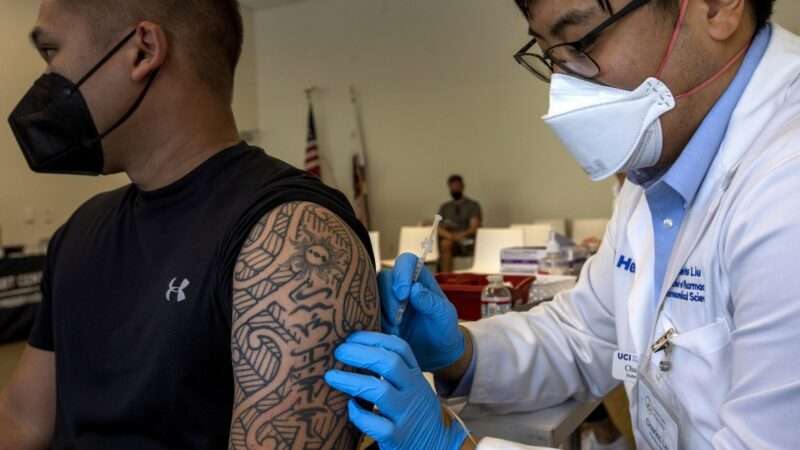
New monkeypox cases in the United States and Europe are starting to decline as we head into September.
NBC News looked over the data from the Centers for Disease Control and Prevention (CDC) and calculated a 40 percent decline in new cases since early August. Cases are also falling in countries like Germany and the Netherlands.
The eventual (and slow-walked) arrival of monkeypox vaccines did probably make a dent in the spread. More than 350,000 doses of the vaccine have been administered. As a reminder, though, the U.S. had more than 1 million doses of a vaccine available in storage in Denmark, but both bureaucratic red tape and indecisiveness on the part of the Department of Health and Humans Services kept them from being deployed quickly enough to stop monkeypox from spreading across the country.
Instead, NBC News notes, gay and bisexual men, once it became clear that sex was the primary source of the disease's spread, pulled back on risky behavior. Research from the CDC found a 50 percent drop in anonymous or random sex among these men, and 20 percent of the men they polled had gotten at least one dose of the monkeypox vaccine.
All of this is evidence that blunt clarity with Americans about how monkeypox is spread was vitally important. It's true that monkeypox is itself not a sexually transmitted disease. It can be spread through saliva and physical contact with the rashes of somebody infected, regardless of where the rashes are on their body. But the strain of monkeypox that spread out of Africa and across Europe and eventually the world turned out to behave like a sexually transmitted disease not unlike herpes. And so, the messaging by health officials that "anybody" could get monkeypox was very misguided and should have been abandoned once it became clear that the vast majority of Americans were not actually at risk.
The current data from the Department of Public Health for Los Angeles County, for example, show that all the early demographic factors are holding steady as cases there start to decline. As of last week, 98 percent of monkeypox infections were among men. Only nine women in the entire county reported infections. Of the infected men, only three percent claim to be heterosexual. Everybody else was either gay or bisexual or declined to say.
The handwringing over how and whether to target gay and bisexual men with specific warnings against careless random sexual encounters was entirely misguided. The data shows that when these men understood the risks, they changed their behavior. NBC News published a story that borders on the comical about how gay men canceled all their sexy party plans for the summer, suggesting that this has been somehow stressful or traumatic. It's temporary, guys. We survived COVID. And this is actually less dangerous.
That NBC story also continues to perpetuate unjustified concerns that monkeypox will lead to fear-based discrimination against gay men similar to the worst days of the AIDS crisis. That fear has been misplaced. There has not been one monkeypox-related backlash that's even worthy of note, and it's silly to keep giving voice to these fears even as the spread starts to recede.
The lesson here is that people should take responsibility for reducing their risk of viral infection whenever possible, not just because it's the moral and mature thing to do, but because we simply cannot expect competent responses from federal agencies when a crisis rears its head.
The post Monkeypox Starts To Recede as Men at Risk Change Sexual Behavior appeared first on Reason.com.







